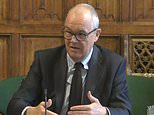Sir Patrick Vallance admits UK needs lockdown handbook for future pandemics as cases rise
Sir Patrick Vallance admits UK needs a lockdown handbook for future pandemics as No10 adviser hints Covid cases are now rising because ministers ditched ‘Project Fear’
UK’s chief scientific adviser says work is being done on future pandemics He says experts have to determine what the best parts of lockdowns wereSpi-B co-chair admitted people are mixing more than earlier in the pandemicProfessor Ann John says messaging change has made them less fearful of cases
<!–
<!–
<!–<!–
<!–
(function (src, d, tag){
var s = d.createElement(tag), prev = d.getElementsByTagName(tag)[0];
s.src = src;
prev.parentNode.insertBefore(s, prev);
}(“https://www.dailymail.co.uk/static/gunther/1.17.0/async_bundle- -.js”, document, “script”));
<!–
DM.loadCSS(“https://www.dailymail.co.uk/static/gunther/gunther-2159/video_bundle- -.css”);
<!–
Officials are already drawing up a lockdown handbook for future pandemics, Sir Patrick Vallance revealed today.
The Government’s chief scientific adviser told MPs that experts are exploring what parts of Covid restrictions worked best in the UK and globally.
Speaking to MPs on the House of Commons Science and Technology Committee, Sir Patrick suggested harsh restrictions could play a part in outbreaks to come.
He said: ‘I do think it is now going to be incredibly important to look internationally and nationally to try to dissect which components of restrictions are the ones that were the most important.
‘The world should learn from this so there is an advice handbook for the future and also to take into account the different characteristics of viruses.’
Earlier, a member of No10’s Covid nudge unit hinted Britons are not changing their behaviours now despite rising cases and hospital rates because they are less scared.
Professor Ann John, who co-chairs SAGE’s behavioural subgroup, told MPs people are mixing more than when infections were at similar levels as Omicron surged in December.
She admitted the Spi-B group advised Government on how to use fear to change how people behave earlier in the pandemic but said the tactic of fearmongering was ditched soon after.
Infections and hospitalisations have surged in the UK since Freedom Day, when all restrictions were dropped and Britons were urged to ‘live with the virus’.
No10’s advice handbook for future pandemics should include all the best ‘components of restrictions’, Sir Patrick Vallance claimed today
Later in the committee, Sir Patrick suggested the removal of curtailments may not last forever, with future pandemics likely to require some sort of lockdown.
He said ‘numerous papers’ have been published on the effectiveness of restrictions, but it is difficult to discern which ones were beneficial.
Sir Patrick dismissed a controversial paper from John Hopkins University economists that claimed lockdowns only reduced deaths by 0.2 per cent.
The paper claimed the stay-at-home order (2.9 per cent), school closures (4.4 per cent) and business closures (10.6 per cent) were individually more effective.
But some experts accused the researchers of ‘cherry-picking’ information, claiming the paper is limited because it brings together different restrictions imposed in different places at different times.
Sir Patrick said future lockdown advice will have to take into account what virus the world is facing or what strain of Covid has taken over.
He said: ‘The transmissibility associated with Omicron is different to the transmissibility associated with Alpha or Wuhan strain, and probably the measures would make a different effect as well.
‘So I think a sophisticated look back at the specific actions in lockdown and which ones had the biggest effect on transmission and circumstances is an important piece of work to do.’
Earlier in the session, Professor John suggested people’s reaction to rising cases has diminished now that Government messaging has been toned down.
She said: ‘It feels like common sense that where you get rising infections or where there is mandated behaviour, that people’s behaviour follows and sometimes they did but sometimes they didn’t.
‘I think the “pingdemic” was really effective in terms of changing people’s behaviours and the way they mixed.
‘We’re seeing much less of a response at the moment to rising levels of infection and hospitalisations.’
She admitted that one of 11 papers first submitted to SAGE by the Spi-B group advocated for a fear-based approach.
Minutes from the group’s March 22, 2020, meeting said: ‘The perceived level of threat is to be increased amongst those who are complacent by using hard-hitting emotional messaging.’
But she claimed the psychiatrists, sociologists, anthropologists and ethicists advising Government communications abandoned the advice later on.
Professor John said: ‘We never advised on upping the levels of fear. I think it was presented as part of the evidence base in terms of the pandemic.
‘And after that, if you look at all our papers — we absolutely advise that fear does not work. Now in terms of communications, we did provide underlying principles.
‘Messages should be simple, rationales should be explained, consistency was important. There were core principles — fear was not one of them.’
![]()


